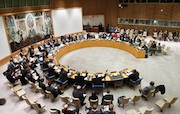
Rebel groups are having a decisive impact on international peace and security, and many contemporary conflicts are characterized by the disintegration of states and the emergence of armed rebel groups. As Mark Drumbl writes in his excellent new book Reimagining Child Soldiers in International Law and Policy: “New wars involve splintering of warring parties, deployment of violence by non-state actors, the emergence of militias and other paramilitary syndicates, mutual and frequent infliction of international humanitarian law violations, and the proliferation of small arms among the general population.”
Multilateral sanctions have become one of the key responses to these groups by the international system. Rather than act against the states in which they operate, the Security Council has sanctioned many groups and their leaders under Article 41 of the UN Charter, including al-Shabaab (Somalia), LURD (Liberia), M23 (Democratic Republic of the Congo (DRC)), COJEP (Côte d’Ivoire), SLA (Sudan), UNITA (Angola), RUF (Sierra Leone), and the RCD (DRC).
In general, targeted sanctions include an asset freeze, travel ban, and arms embargo. In countries with porous borders and informal financial systems, however, these measures are difficult to implement and enforce. Indeed, rebels live in remote areas and keep their money outside of official banking institutions, are unlikely to be affected.
Targeted sanctions against rebels and armed groups, therefore, generally contain three additional features: (i) commodity sanctions on minerals or natural resources (such as timber) to starve rebels of their financing, (ii) incorporation of international humanitarian and human rights norms, and (iii) references to internal conditions in the country, by, for example, condemning widespread violence against women and children, or calling for free and fair elections.
Security Council Resolution 2078 (2012) on the DRC is illustrative of these trends in that it reaffirms the travel, asset, and arms sanctions established in Resolution 1857 (2008), but then applies them specifically to foreign military groups and Congolese militias, individuals, and other entities. Moreover, the resolution highlights the linkage between the illegal exploitation of natural resources and the exacerbation of conflicts.
It is also interesting to note that the resolution names a panoply of militias implicated in the conflict, including M23, the Democratic Forces for the Liberation of Rwanda (FDLR), the Lord’s Resistance Army (LRA), Mai Mai militias, the Forces Nationales de Liberation (FNL), and the Allied Democratic Forces (ADF).
By way of comparison, the International Criminal Court and the Special Court for Sierra Leone have also acted against rebel leaders (including Thomas Lubanga Dyilo, members of the Armed Forces Revolutionary Council (AFRC), and the Revolutionary United Front (RUF)). Yet, international criminal law has its drawbacks due to expense, capacity, time constraints, and subject matter jurisdiction in that international criminal liability will only apply to the gravest violations. As a result, sanctions against armed groups look like they are here to stay.
Despite resurging interest in the effects of multilateral sanctions, there is a curious gap in recent sanctions literature on armed groups. Otherwise excellent studies have been silent on the Council’s growing inclination to target rebels and militias directly, and there is little analysis of the effects of multilateral sanctions on armed groups. This knowledge gap needs to be addressed, and research on sanctions and civil war is now being done here at the International Peace Institute.
The Security Council is uniquely positioned to create multi-pronged, legally-binding strategies to deter rebels and the countries they operate in. Moreover, because many of the armed groups operate in a regional context and are supported by international markets for natural resources, the Security Council’s ability to bind multiple countries gives it a significant advantage. As non-state actors continue to play central roles in conflicts around the world, there needs to be international legal tools that reach particular actors inside conflict states, and mechanisms to make sure these tools are effective.
Kristen E. Boon is a Visiting Senior Advisor at the International Peace Institute (IPI). Andrea Ó Súilleabháin, Visiting Fellow at IPI, contributed research.
About the photo:The UN Security Council votes to extend sanctions against the M23 rebel group, November 2012. UN Photo/Devra Berkowitz




